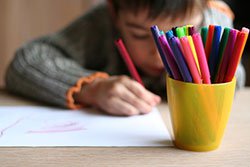School PsychologyMaking a difference by helping students reach their potential
School psychologists make important contributions to the social, emotional and academic development of students by serving as advocates for good mental health and safe and supportive learning environments. Working as partners with parents, educators and fellow mental health professionals, school psychologists help students reach optimal levels of achievement and well-being. School psychologists in Illinois have specialized training in child development, mental health, learning theory, motivation, and education. They hold master's, educational specialist, or doctoral degrees and must complete 60 graduate-level semester hours including supervised practicum experiences and a year-long internship. Illinois school psychologists must be credentialed by the Illinois State Board of Education and may be certified by the National School Psychology Certification Board. All school psychologists adhere to the professional standards and code of ethics of the National Association of School Psychologists. Broad continuum of servicesAn integral member of a school's educational and health care team, the school psychologist contributes to a broad range of services. PreventionBy evaluating tests and other relevant data, school psychologists assist school districts to identify students at risk for academic or emotional problems. Using systematic problem-solving models, they develop scientifically based interventions addressing learning or mental health challenges. School psychologists also help to develop and implement programs designed to prevent violence, depression, suicide, substance abuse, truancy, teen pregnancy, and peer pressure among at-risk students. In addition, diversity training programs developed by school psychologists create student respect for and appreciation of various cultures and lifestyles, assuring a safe and supportive learning environment for all. InterventionSchool psychologists often work face-to-face with children and families in individual and group settings to help solve conflicts and problems. This work may involve psychological counseling, social skills training, behavior management, decision-making and problem-solving skills development, and other strategies. School psychologists also respond to crisis situations and traumatic events in families, in schools, and among peers. ConsultationSchool psychologists develop strong collaborative relationships with parents, teachers and community services to create an understanding of child development and to design healthy and effective interventions for learning and behavior problems. School psychologists also consult with school administrators regarding district-wide initiatives, policy decisions, and curriculum development. AssessmentUsing a wide variety of techniques, school psychologists conduct formal and informal assessments to determine a student's intellectual abilities, learning needs, achievement levels, emotional and behavioral functioning, and social skills. Education and planningSchool psychologists conduct staff development activities for teachers, as well as parent education programs. Issues covered in these activities and programs include peer relations, family dynamics, community resources, teaching and learning strategies, substance abuse, crisis management, and how to work with students with disabilities or unusual talents. AdvocacySchool psychologists facilitate referrals to specialists when appropriate. School psychologists often serve as liaisons for school-community partnerships and work with legislators and policymakers to improve educational and mental health laws and public policies. |


